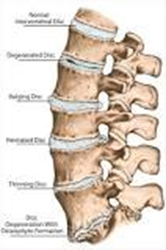A nurse is caring for a client who has degenerative disc disease. Which of the following assessment findings should the nurse understand might develop with this condition?
(Select All that Apply.)
Hyponatremia
Paresthesia
Foot drop
Intermittent pain Hyperreflexia
Correct Answer : B,C,D
Choice A Reason:
Hyponatremia is incorrect. Hyponatremia refers to low sodium levels in the blood and is not typically associated with degenerative disc disease. This finding is unrelated to the pathophysiology of DDD.
Choice B Reason:
Paresthesia is correct. Yes, paresthesia, which refers to abnormal sensations such as tingling, numbness, or burning, can develop with degenerative disc disease. Nerve compression or irritation due to disc degeneration can lead to paresthesia in the affected area, typically radiating along the nerve pathway.
Choice B Reason:
Foot drop is correct. Yes, foot drop can develop with degenerative disc disease, especially if the condition leads to nerve compression or damage in the lumbar spine (lower back). Foot drop refers to difficulty lifting the front part of the foot due to weakness or paralysis of the muscles involved in dorsiflexion.
Choice D Reason:
Intermittent pain is correct. Yes, intermittent pain is a hallmark symptom of degenerative disc disease. Pain may vary in intensity and may worsen with certain movements or activities. Individuals with DDD may experience episodes of acute pain, as well as chronic, persistent discomfort.

Nursing Test Bank
Naxlex Comprehensive Predictor Exams
Related Questions
Correct Answer is D
Explanation
Choice A Reason:
Weight loss is inappropriate. Weight loss can occur in individuals with COPD, particularly in advanced stages of the disease. Factors contributing to weight loss may include decreased appetite, increased energy expenditure due to labored breathing, and muscle wasting.
Choice B Reason:
Poor nutrition is inappropriate. Poor nutrition is a significant risk factor in COPD. Individuals with COPD may experience difficulties with eating due to dyspnea, fatigue, and reduced appetite. Malnutrition can lead to muscle weakness, decreased immune function, and worsened respiratory status.
Choice C Reason:
Muscle dysfunction is inappropriate: Muscle dysfunction, particularly skeletal muscle dysfunction, is common in COPD. Reduced physical activity, systemic inflammation, oxidative stress, and metabolic abnormalities contribute to muscle wasting and weakness in individuals with COPD.
Choice D Reason
.Increased risk for pneumonia is incorrect. Individuals with COPD are at an increased risk for respiratory infections, including pneumonia. COPD-related factors such as impaired mucociliary clearance, airway inflammation, and reduced lung function predispose patients to respiratory infections.
Correct Answer is C
Explanation
Choice A Reason:
Respiratory alkalosis is incorrect. Tension pneumothorax typically leads to respiratory distress and hypoxemia rather than respiratory alkalosis. The respiratory alkalosis may occur initially due to hyperventilation in response to hypoxemia but would not be directly related to tracheal deviation.
Choice B Reason:
Increased venous return is incorrect. Tension pneumothorax actually leads to decreased venous return due to compression of the great vessels in the thorax, particularly the superior vena cava and the inferior vena cava. This compression results from the increased pressure within the thorax, which impedes blood flow back to the heart.
Choice C Reason:
Decreased cardiac output is incorrect. Tension pneumothorax can indeed lead to decreased cardiac output due to compression of the heart and the great vessels by the accumulating air in the pleural space. This compression decreases venous return and impairs cardiac function.
Choice D Reason:
Dilated ventricles is incorrect. As mentioned earlier, tension pneumothorax can lead to compression of the heart, including the ventricles. This compression can cause dilatation of the ventricles, particularly the right ventricle, due to increased afterload and decreased venous return.
Whether you are a student looking to ace your exams or a practicing nurse seeking to enhance your expertise , our nursing education contents will empower you with the confidence and competence to make a difference in the lives of patients and become a respected leader in the healthcare field.
Visit Naxlex, invest in your future and unlock endless possibilities with our unparalleled nursing education contents today
Report Wrong Answer on the Current Question
Do you disagree with the answer? If yes, what is your expected answer? Explain.
Kindly be descriptive with the issue you are facing.
